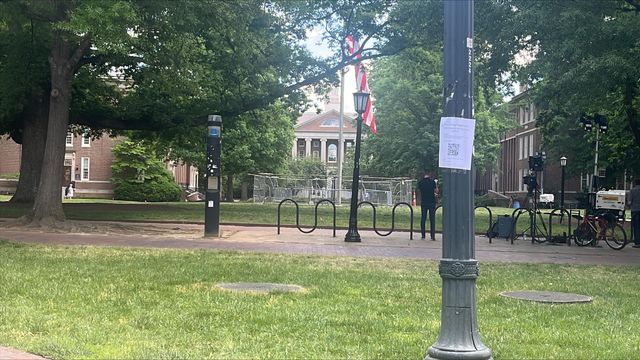A day after police confront protesters, UNC examines best practices for tense situations on campus
On Wednesday afternoon, university leaders met to talk about the past several days of protests on UNC-Chapel Hill's campus.
The demonstrations all culminated in a clash with police Tuesday afternoon.
At UNC, the scene was completely different on Wednesday as opposed to Tuesday.
Campus police were seen wandering around, but no protesters could be seen. Wednesday, WRAL News talked to two experts about the laws surrounding these protests, and when police can intervene.
A far different scene on UNC's campus today as protesters are long gone and replaced by students now laying on the lawn.
However, security has been added to protect South Hall, from cameras to lights.
Chaos broke out Tuesday during the pro-Palestinian protest, dozens busting through barricades, at one point replacing the American flag with a Palestinian flag.
"When they decided to take down the flag, the flag didn't belong to any single individual in the crowd. That flag is property of the state of North Carolina," said attorney and retired police officer Lee Turner.
Turner said officers acted well within the law to use pepper spray and force to protect themselves and those on campus.
"They are coming at them with metal barriers and they had to protect themselves at a chemical agent like pepper spray is appropriate," Turner said.
We also asked a law professor how these protests are allowed and how long can they go on?
"In an area designated as a public forum you don't need a permit," said North Carolina Central University professor Irving Joyner.
Joyner said protesters have a right to be on campus, but must follow university guidelines.
"When you take over property and force participation by people who are not otherwise involved in it, then you're getting into murky ground," Joyner said.
In a faculty meeting on Wednesday, UNC leaders tried to identify shared values on how to move forward, acknowledging that they may have different views on the protests and use of law enforcement. Leaders also talked about potentially asking the university for more communication during protests.
"I’m wondering if there are resources for students who have been arrested," said UNC professor Claudia Yaghoobi. "Are they going to face retaliation? Protecting our students is our first job, and for faculty and admin, no matter where they stand politically."
WRAL News asked the university about their rules for protests on campus and why it took five days to break up the encampment. We have yet to hear back.












